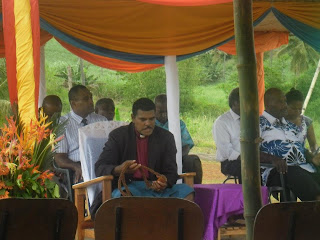




from w
What will they think about next? Who is going to listen in to the conversation of a group of women at the marketplace? Since when has gossiping/talanoa/yarning/telling stories about people been a crime? Sobosobo! Talking is what we women do!
Gossiping is a crimeSalaseini Vosamana
Friday, March 16, 2012
A GROUP of women vendors in Labasa were yesterday told to refrain from gossiping because it was against the law. Organised by the community policing officers in the north, the short discussion was aimed at bringing women together to inform them about the new Crimes Decree associated with women issues.
In her formal address, police constable Mere Mocetoka told the women that anyone was liable to spend one year in prison if found gossiping or making bad remarks about another person.
"Every day, new faces visit the market and women are fond of sitting together in groups to make gestures and gossip about them," Constable Mocetoka said.
"It's an attitude we have grown up with but it is something the law recognises as illegal. Gossiping is a contributing factor to fights and hatred among one another, which is something very common in women," she said.
Constable Mocetoka said they decided to organise the brief discussion because they received complaints of gossiping from women last week.
"We have been receiving complaints since last week and the best way to solve this problem is by telling them (women) the penalties they are likely to face when they are charged.
"Nowadays, an old woman can be sent to prison if she is found gossiping.
"The law won't entertain such unsuitable behaviour," she said.
The women thanked the force for informing them about the new Crimes Decree, something they were not aware of.
----------
And also here's an article from the internet - that gossip is good for women!
Gossiping is healthy?
June 7th, 2011 | Author: admin
Gossiping ?..Mmm..mm!!.spontanously commented about someone else looks, friend’s affair, what and why someone doing or not doing are common behaviour isn’t it?!, particularly among women. Talking and laughing about beauty, men, fashion even watching tv gossip seems fun indeed, not surprisingly many women can stand gossiping for hours.
Is gossiping have benefits? Even healthy?.
Based on researches lead by Prof. Stephanie Brown from university of Michigan, shows that gossiping activity which always associated with women, is good for their health. Wow, ..how come?!. Stephanie and collegues explained that women tends to feel much eager and happier when they enjoy gossiping with their friends. Those actifivity can reduces stress, anxiety and worries. Gossiping can improve progesterone hormone. This hormone has significant role for women. Its affecting ability to interact with peoples. Research shows that women with less-gossiping activity experiences decreasing progesterone hormone. On the other hand, women with high-gossiping activity will be much happier, flexible, healthy and live longer.
Why women are gossiping?
Curiousity. People particularly women easyly curious about other people’s affair.
Women has need for sharing every informations about their daily lifes.
Women seeing gossiping as a media to seek informations around her.
Women loves a detail information about anything than men.
Some study shows that women more confidence to talking about something than men.
A study shows that women has powerful capability to spread information than men.
Most women liking and enjoying talking than men.
Women more expressive than men to talk or exposing about something than men.
Talking, and then go on to gossiping isn’t easily thing to avoid.
People or most women tends to easily interested, sensitive and focused on negative informations.
Surprisingly, human brain have strong capability to catch and remind negative than neutral or positive information.
Study shows that people having tendency to talking, gossiping, or even judging others.
Advantages of gossiping
A scientist Robin Dunbar from Oxford university says that gossiping isn’t always bad thing, it can be a media to collect unity among people.
Researcher Eliza Bliss-Moreau says that by gossiping, we can learn and stay away from any bad thing that people we are talked about. Its mean we can learn from bad examples.
Even gossing has positive effect, it doesn’t mean gossiping turned to a bad habit. So, go gossiping girl!,..but control it ok, don’t let it ruining our daily life by gossiping time to time and forgetting any others that is more important. Do you agreed ?..












